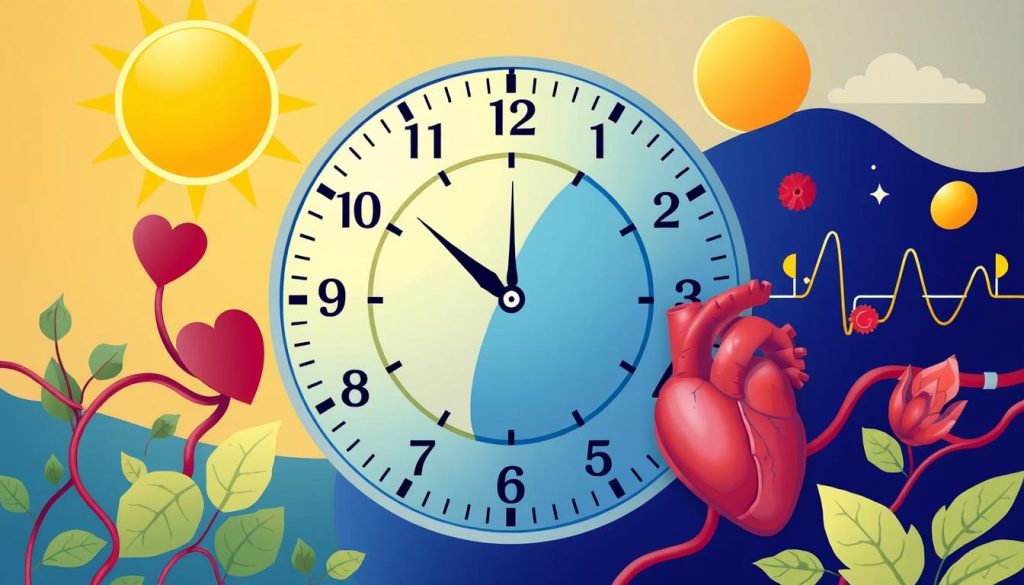Exploring circadian rhythms, I see their big role in controlling blood pressure and heart health. These natural cycles affect our sleep and daily activities. Knowing how they impact blood pressure is key to a healthy life.
I’ll look at studies and expert views on circadian rhythms and high blood pressure. They show how important it is to live in sync with these rhythms for better health.
Understanding Circadian Rhythms
Circadian rhythms are key to our body’s functions. They are physical, mental, and behavioral changes that happen every 24 hours. Our biological clock works with light and temperature to control sleep and metabolism.
Defining Circadian Rhythms
Circadian rhythms are our body’s natural day cycles. They control when we sleep, hormones, body temperature, and more. For instance, daylight makes me feel more alert, showing how rhythms match our surroundings.
How Circadian Rhythms Work
The way circadian rhythms work is amazing. They rely on our biological clock, especially the SCN in the brain. This small area tells our body when to do things.
Light tells the SCN what to do. So, when it gets light, our body gets ready for the day. And when it gets dark, we get ready to sleep. This shows how our body and environment are connected.

| Aspect | Function | Influences |
|---|---|---|
| Sleep-Wake Cycle | Regulates sleeping and waking times | Light exposure, evening melatonin release |
| Hormone Release | Controls the timing of hormonal fluctuations | Daily cycles, seasonal changes |
| Body Temperature | Affects daily temperature variations | Environmental factors, activity levels |
The Impact of Circadian Rhythm on Overall Health
Learning about circadian rhythms shows us big health benefits. When I match my life with these natural cycles, I feel better physically and mentally. Let’s dive into these advantages.
Physical Health Benefits
My physical health depends on matching my activities with my body’s natural clocks. When these rhythms get out of sync, I might sleep poorly and feel sick more often. Some key benefits include:
- Improved sleep quality, leading to better recovery and energy levels.
- Enhanced immune function, decreasing the likelihood of illnesses.
- Better heart health, with a regulation of blood pressure through consistent sleep patterns.
Mental Health and Well-Being
My mental state is linked to my circadian rhythms. When these rhythms are off, I’m more at risk for anxiety and depression. Keeping a healthy rhythm helps me stay emotionally stable. Some mental health benefits include:
- Reduced symptoms of anxiety and depression.
- Greater emotional stability and resilience to stress.
- Enhanced cognitive function and memory retention.

By understanding and embracing these insights, I can improve my health. This focus on my circadian rhythms helps me live my best life every day.
Circadian Rhythm and Blood Pressure Regulation
Circadian rhythms are key in controlling blood pressure, guiding how our bodies handle high blood pressure all day. They help us understand how our heart health is managed through natural cycles.
Blood pressure changes throughout the day, usually going up in the morning and down at night. This pattern follows our circadian rhythm, which controls many body functions like hormone release and blood vessel function. If this rhythm gets disrupted, it can cause high blood pressure to stay high, raising the risk of heart problems.
Studies show that people with irregular sleep or work schedules have different blood pressure patterns. This means keeping a regular circadian rhythm is crucial for managing blood pressure. Those who don’t stick to a regular sleep schedule often see their blood pressure vary, showing how important rhythm is for heart health.
To show the link between circadian rhythms and heart health, here’s a table:
| Time of Day | Blood Pressure Level | Potential Impact |
|---|---|---|
| Morning | Increased | Higher risk of hypertension |
| Afternoon | Stable | Normal cardiovascular function |
| Night | Decreased | Lower stress on the heart |

The Science Behind Blood Pressure Fluctuations
Blood pressure changes throughout the day due to many factors. It shows how our bodies react to different things. These changes follow our natural day-night cycle.
Daily Patterns of Blood Pressure
Blood pressure follows a 24-hour pattern. At night, it drops as we sleep. This helps our heart and blood vessels rest.
When we wake up, blood pressure goes up. This prepares us for the day. Studies show this pattern is linked to our body’s internal clock.
Influence of Sleep on Blood Pressure Levels
Sleep affects blood pressure a lot. Not getting enough sleep can raise blood pressure. This is because our body tries to compensate for lack of rest.
Good sleep is key to keeping blood pressure stable. It helps our heart stay healthy. Getting enough sleep is crucial for our blood pressure.
Factors Influencing Circadian Rhythm
Keeping my circadian rhythm in check is vital for my health. Many factors, from my daily habits to outside influences, affect it. Knowing what impacts my internal clock helps me stay healthy and manage my blood pressure.
Lifestyle Choices Impacting Circadian Rhythms
My diet, exercise, and sleep habits shape my circadian rhythm. Eating well, like fruits and whole grains, helps me sleep better. Exercise reduces stress and improves sleep, keeping my rhythm steady.
Good sleep habits, like a cozy bedroom and no screens before bed, also help. These practices boost my physical and mental health.
Environmental Influences
Light and temperature also shape my circadian rhythms. Morning sunlight boosts melatonin, helping me sleep. I should get lots of sunlight in the morning and avoid bright lights at night.
Keeping my bedroom cool also improves sleep. This makes it easier for my body to follow the day’s natural rhythms.

